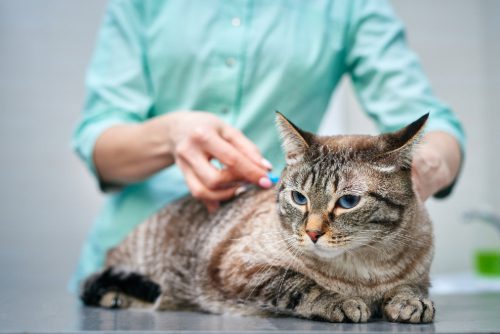The Importance of Routine Cat and Dog Vaccinations
When it comes to protecting your pet’s long-term health, few things are as effective or as simple as staying current with their vaccines. Vaccinations play a key role in preventing serious diseases that can spread quickly among animals and, in some cases, even affect people. While it may be easy to put off a trip to the vet if your pet seems perfectly healthy, those routine shots are doing much more than you realize. They’re a safeguard against invisible threats, a way to extend your pet’s life, and an essential part of responsible pet ownership. In this blog, we’ll walk you through the importance of cat and dog vaccinations, what they prevent, how they work, and when your pet might need them. To schedule your pet’s vaccinations at LePar Animal Hospital in Evergreen Park, IL, call us at (708) 423-3200 or book an appointment online today.

Why Vaccinations Matter for Cats and Dogs
Routine vaccinations are a proactive way to protect your pet from preventable diseases. Many of the conditions vaccines help prevent are not only dangerous but also difficult and expensive to treat once symptoms appear. In some cases, these diseases can be fatal. Vaccinating your cat or dog dramatically reduces the risk of infection, both for them and for the wider pet community.
Community Protection and Herd Immunity
Vaccines don’t just help the pet receiving them—they also contribute to broader community health. When the majority of pets in an area are vaccinated, the likelihood of a disease outbreak goes down. This concept, known as herd immunity, helps protect pets who may be too young, too old, or too ill to receive vaccines themselves. By keeping your own pet up to date on vaccinations, you’re helping to prevent the spread of disease across the community.
Legal Requirements and Travel Regulations
Some vaccinations, such as rabies, are required by law. Skipping these vaccines could result in fines or restrictions on where your pet is allowed to go. Additionally, if you plan to board your pet, enroll them in daycare, or travel across state or international borders, certain vaccines may be mandatory.
Core vs. Non-Core Vaccines: What’s the Difference?
Veterinarians typically divide vaccines into two categories: core and non-core. Understanding the distinction can help you make informed decisions about what your pet needs.
Core Vaccines
Core vaccines are recommended for all pets, regardless of lifestyle or environment. These vaccines protect against diseases that are widespread, highly contagious, and often life-threatening.
For dogs, core vaccines include:
- Rabies
- Distemper
- Parvovirus
- Adenovirus (Canine Hepatitis)
- Bordetella (kennel cough)
- Leptospirosis
For cats, core vaccines include:
- Rabies
- Feline herpesvirus
- Calicivirus
- Panleukopenia (feline distemper)
These diseases can cause severe illness or death and are often very difficult to treat once symptoms develop. The importance of cat and dog vaccinations lies in their ability to prevent these illnesses entirely.
Non-Core Vaccines
Non-core vaccines are recommended based on a pet’s specific risk factors, such as age, location, lifestyle, and exposure to other animals.
Non-core vaccines for dogs may include:
- Lyme disease
- Canine influenza
Non-core vaccines for cats may include:
- Feline leukemia virus (FeLV)
- Bordetella
- Chlamydophila felis
If your dog goes hiking, swims in natural bodies of water, or is boarded often, they may benefit from non-core vaccines. The same applies to cats who go outdoors or live with other cats. Your veterinarian will help determine which non-core vaccines are appropriate for your pet.
How Vaccines Work in Cats and Dogs
Vaccines work by stimulating your pet’s immune system to recognize and fight off specific viruses or bacteria. When your pet receives a vaccine, their body produces antibodies that “learn” to identify the disease. If your pet is later exposed to the real disease, their immune system will recognize it and respond more quickly and effectively.
The Role of Boosters
Many vaccines require booster shots to maintain immunity over time. For example, the distemper-parvo combination for dogs and the FVRCP for cats are usually given in a series when pets are young, followed by periodic boosters throughout their life. Your veterinarian will recommend a schedule tailored to your pet’s needs.
When to Vaccinate: Timelines for Dogs and Cats
A timely vaccination schedule is critical for giving your pet the best possible protection. Starting at a young age ensures they’re covered during vulnerable developmental stages.
Puppy and Kitten Vaccination Schedule
Puppies and kittens receive a series of vaccines beginning around 6 to 8 weeks of age. These initial vaccines are repeated every 3 to 4 weeks until they’re about 16 weeks old. This schedule helps ensure their immune system builds up enough protection before exposure to potentially dangerous diseases.
Adult Dog and Cat Vaccine Schedule
Once your pet reaches adulthood, your vet will recommend annual or triennial boosters, depending on the vaccine. Some vaccines, like rabies, may be given every 1 to 3 years depending on state regulations and the specific product used. Even indoor pets need vaccinations. Infectious diseases can still enter the home on clothing, shoes, or through open windows.
Common Questions About Pet Vaccinations
Many pet owners have questions about how vaccinations affect their animals and whether they’re really necessary. Here are a few of the most common concerns.
Are Vaccines Safe?
Vaccines used by veterinarians are carefully tested for safety and effectiveness. Side effects are typically mild and short-lived, such as soreness at the injection site or slight fatigue. Severe reactions are rare, and your vet will monitor your pet closely during and after the appointment.
What If My Pet Missed a Vaccine?
If your pet misses a vaccine, call your veterinarian right away to discuss the next steps. In some cases, restarting the vaccine series may be recommended. Delaying vaccines increases the risk of disease, so it’s best to stay as close to schedule as possible.
Why Does My Indoor Cat Need Vaccines?
Even cats who never step outside can be exposed to airborne viruses, bacteria brought in on shoes or hands, or infections passed from other pets. The importance of cat and dog vaccinations includes protecting against unseen risks, even for pets with limited outdoor access.
Choosing the Right Vaccines at LePar Animal Hospital
Every pet is unique, and so is their vaccination plan. At LePar Animal Hospital, we tailor vaccination schedules based on age, lifestyle, environment, and risk of exposure. During your pet’s wellness exam, our team will review their health history and recommend the vaccines that offer the right protection without over-vaccinating.
Whether you’ve just welcomed a new puppy or kitten into your home, or you’re keeping your adult pet’s boosters up to date, we’re here to guide you through every step. To schedule your pet’s vaccination appointment in Evergreen Park, IL, call us at (708) 423-3200 or book online through our website.
Recent Posts
About Us
LePar Animal Hospital has served generations of pets and families in Evergreen Park, Oak Lawn, Palos, and neighboring suburbs, and we hope to serve generations more! Our animal hospital is accredited by the American Animal Hospital Association (AAHA) and staffed with Fear Free Certified veterinarians providing a multitude of services, from wellness and dental care to acupuncture, chemotherapy, and surgery.
